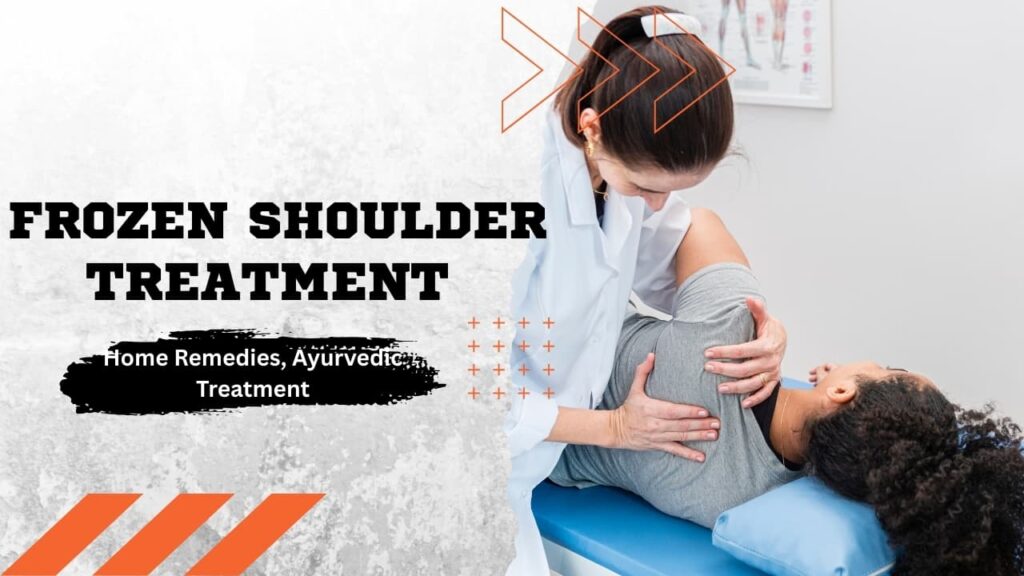Last updated on May 21st, 2025 at 12:55 pm
 Frozen shoulder, medically known as adhesive capsulitis, is a condition characterized by stiffness, pain, and limited range of motion in the shoulder joint. It can significantly impede one’s ability to perform daily activities and affect the overall quality of life. However, with the right approach to treatment, it is possible to thaw out the frozen shoulder and regain mobility.
Frozen shoulder, medically known as adhesive capsulitis, is a condition characterized by stiffness, pain, and limited range of motion in the shoulder joint. It can significantly impede one’s ability to perform daily activities and affect the overall quality of life. However, with the right approach to treatment, it is possible to thaw out the frozen shoulder and regain mobility.
A typical journey of frozen shoulder involves advancing through three distinct phases: the initial stage of freezing, followed by the full-on frozen phase, and ultimately transitioning into the thawing stage. During the freezing stage, pain gradually increases, and shoulder movement becomes limited.
During the frozen phase, discomfort might diminish, yet rigidity persists, greatly constraining the range of motion in the shoulder. Finally, during the thawing stage, shoulder movement gradually improves.

Frozen Shoulder Treatment
The best treatments for Frozen Shoulder are mentioned below:
Physical Therapy: Physical therapy plays a central role in the treatment of a frozen shoulder. Therapeutic exercises aimed at stretching and strengthening the shoulder muscles can help improve flexibility and range of motion. A physical therapist can design a customized exercise program tailored to the individual’s specific needs and the stage of a frozen shoulder.
Medications: Pain and inflammation associated with a frozen shoulder can be managed with nonsteroidal anti-inflammatory drugs (NSAIDs) such as ibuprofen or naproxen. In some cases, corticosteroid injections into the shoulder joint may be recommended to reduce inflammation and alleviate pain.
Heat and Cold Therapy: Applying heat to the shoulder can help relax muscles and increase blood flow, promoting healing and reducing stiffness. Cold therapy, on the other hand, can help numb the area and alleviate pain. Alternating between heat and cold therapy can provide relief from symptoms.
Manual Therapy: Techniques such as massage and mobilization performed by a qualified healthcare provider can help improve shoulder mobility and reduce stiffness. Manual therapy techniques aim to break up scar tissue and adhesions within the shoulder joint, allowing for a greater range of motion.
Acupuncture: Acupuncture, an ancient Chinese therapy involving the insertion of thin needles into specific points on the body, has been shown to provide relief for some individuals with frozen shoulders. It is believed to stimulate the body’s natural healing response and promote relaxation of muscles.

Surgery: In severe cases of frozen shoulders that do not respond to conservative treatments, surgery may be considered. Surgical options include manipulation under anaesthesia, during which the shoulder is forcefully moved to break up scar tissue, and arthroscopic release, a minimally invasive procedure to cut through tight portions of the shoulder capsule.
Ayurvedic Treatment for Frozen Shoulder
Ayurvedic treatment for frozen shoulder focuses on restoring balance to the body’s doshas, particularly Vata, which is believed to be responsible for the condition. Therapies may include herbal remedies, external oil massages, and specific dietary recommendations to reduce inflammation and promote joint mobility.
Ayurvedic treatments aim to address the root cause of frozen shoulder while also providing relief from pain and stiffness through natural, holistic approaches. However, it’s essential to consult with a qualified Ayurvedic practitioner to ensure personalized and effective treatment tailored to individual needs.
Conclusion:
Frozen shoulder can be a challenging condition to manage, but with the right approach to treatment, significant improvements in symptoms and shoulder mobility can be achieved. From physical therapy and medications to alternative therapies like acupuncture, there are various options available to individuals suffering from frozen shoulders.
It’s essential to work closely with healthcare providers to develop a comprehensive treatment plan tailored to your specific needs and stage of frozen shoulder. With patience, perseverance, and the right interventions, you can defrost the ice and regain functionality in your shoulder joint.
Read: What are Generic Medicines?
FAQs on Frozen Shoulder Treatment
Q1. What is frozen shoulder treatment?
Frozen shoulder treatment typically involves a combination of physical therapy, medications to manage pain and inflammation, and heat/cold therapy. In more severe cases, surgical options such as manipulation under anaesthesia or arthroscopic release may be considered.
Q2. Can a frozen shoulder be treated without surgery?
Yes, a frozen shoulder can often be effectively treated without surgery. Conservative approaches such as physical therapy, medications, and heat/cold therapy are typically the first-line treatments. These methods aim to reduce pain, inflammation, and stiffness while improving shoulder mobility. Surgical intervention typically becomes a consideration when conventional therapies prove ineffective in delivering relief.
Q3. How long does it take to recover from a frozen shoulder with treatment?
The recovery time for a frozen shoulder varies depending on the individual and the severity of the condition. With appropriate treatment, many people experience significant improvement within several months to a year. However, some cases may take longer to resolve fully. Consistency with treatment, including regular physical therapy exercises, can help expedite the recovery process.
Q4. Are there any alternative therapies for treating frozen shoulder?
Yes, several alternative therapies may complement conventional treatments for frozen shoulder. These include acupuncture, which can help alleviate pain and promote relaxation of shoulder muscles. Additionally, manual therapy techniques such as massage and mobilization may aid in breaking up scar tissue and improving shoulder mobility. It’s essential to discuss any alternative therapies with a healthcare provider to ensure they are safe and appropriate for your individual situation.
Related Links:
- Fever after Covishield Vaccine Treatment
- Dry Cough Treatment
- Endometriosis Treatment
- Dog Bite Treatment
- Breast Cancer Treatment
- PCV in Blood Test
- Normal Hemoglobin Level in Female
- How to use Menstrual Cups?
- How to Remove Gas from Stomach Instantly?
- How to Reduce Period Pain?
- How to increase Testosterone Level?

